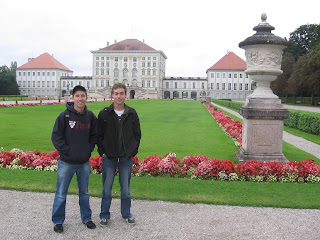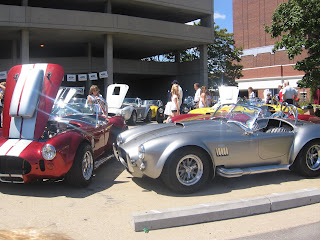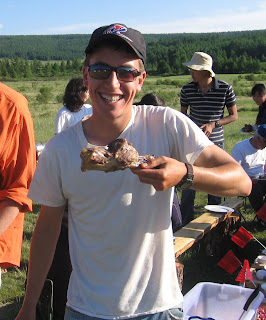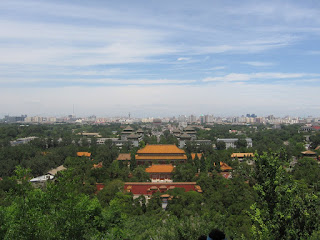One reason I've always enjoyed taking German classes has to do with Germany's relationship to its past. Germany has some pretty hefty subjects to grapple with. Martin Luther's rebellion, two world wars, and the holocaust don't easily pass from a people's collective memory.
Germany doesn't try to forget either. While I haven't even been here a month yet, I encounter German history often. Golden cobblestones mark houses where Jews forced from their homes during World War II lived. Bullet holes can still be seen from where Hitler fought Bavarian police during his
1923 putsch. The
Dachau Concentration Camp lies right outside the city.
On Thursday, I used my day off from school to go to Dachau, something I was not looking forward to, but knew I had to do. Dachau was a work camp, not an extermination camp, so the exhibits focused mostly on the terrible labor and conditions that prisoners (political enemies of the Nazis, Jews, homosexuals, etc.) went through. While Dachau didn't have gas chambers or ovens, the SS murdered thousands of "attempted escapees," allowed thousands more to die of starvation and exhaustion, and performed brutal, "medical" experiments on prisoners.

Walking up to the camp from the bus stop, I was looking at the beautiful fall colors when I suddenly caught a glimpse of the iconic "ARBEIT MACHT FREI" ("work will set you free") gate leading into the camp. I felt like someone had punched me in the stomach. Seeing this image in person suddenly made the horrors of the holocaust tangible. It lept from the pages of a history book into cold, hard reality. I felt like puking.
The camp memorial, financed by the German government, doesn't seem to skip over anything. Graphic photos of prisoners line the museum. Details of Nazi brutality sit on every display case. Clips from WWII-era German newspapers show the propoganda and lies surrounding the camp.
The camp continues to negatively affect people, as well. The City of Dachau lies about a half hour outide of Munich. Although Munich and the surrounding area are the most expensive places to live in all of Germany, Dachau remains very cheap. People don't want to live near the camp.
German liscense plates also show where the car is registered. People from Munich have a M as the first letter. People from Dachau have DAH. Cars with DAH inside Munich are often keyed.

While current Dachau residents are just as guilty of the atrocities commited at the camp as I am, the anger towards their city isn't hard to understand. Everyone knows the name Dachau for a reason. And it's a reason today's Germans wish had never happened.
[correction appended 19. January, 2009: Dachau did, in fact, have a gas chamber and ovens. Whether the gas chamber was ever used for mass exterminations is apparently debatable, but the ovens were often used to cremate the remains of murdered "attempted escapees" and starved prisoners.]



























